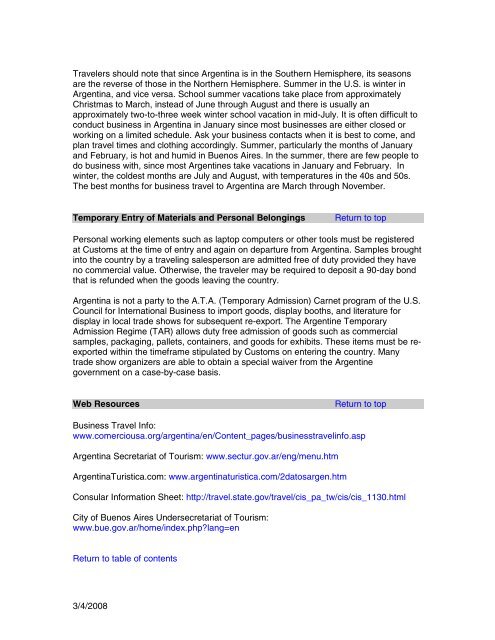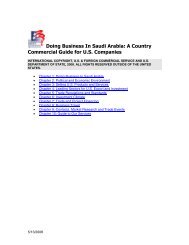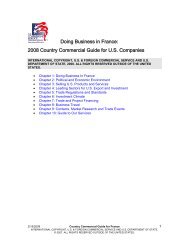Create successful ePaper yourself
Turn your PDF publications into a flip-book with our unique Google optimized e-Paper software.
Travelers should note that since <strong>Argentina</strong> is in the Southern Hemisphere, its seasons<br />
are the reverse of those in the Northern Hemisphere. Summer in the U.S. is winter in<br />
<strong>Argentina</strong>, and vice versa. School summer vacations take place from approximately<br />
Christmas to March, instead of June through August and there is usually an<br />
approximately two-to-three week winter school vacation in mid-July. It is often difficult to<br />
conduct business in <strong>Argentina</strong> in January since most businesses are either closed or<br />
working on a limited schedule. Ask your business contacts when it is best to come, and<br />
plan travel times and clothing accordingly. Summer, particularly the months of January<br />
and February, is hot and humid in Buenos Aires. <strong>In</strong> the summer, there are few people to<br />
do business with, since most Argentines take vacations in January and February. <strong>In</strong><br />
winter, the coldest months are July and August, with temperatures in the 40s and 50s.<br />
The best months for business travel to <strong>Argentina</strong> are March through November.<br />
Temporary Entry of Materials and Personal Belongings Return to top<br />
Personal working elements such as laptop computers or other tools must be registered<br />
at Customs at the time of entry and again on departure from <strong>Argentina</strong>. Samples brought<br />
into the country by a traveling salesperson are admitted free of duty provided they have<br />
no commercial value. Otherwise, the traveler may be required to deposit a 90-day bond<br />
that is refunded when the goods leaving the country.<br />
<strong>Argentina</strong> is not a party to the A.T.A. (Temporary Admission) Carnet program of the U.S.<br />
Council for <strong>In</strong>ternational <strong>Business</strong> to import goods, display booths, and literature for<br />
display in local trade shows for subsequent re-export. The Argentine Temporary<br />
Admission Regime (TAR) allows duty free admission of goods such as commercial<br />
samples, packaging, pallets, containers, and goods for exhibits. These items must be reexported<br />
within the timeframe stipulated by Customs on entering the country. Many<br />
trade show organizers are able to obtain a special waiver from the Argentine<br />
government on a case-by-case basis.<br />
Web Resources Return to top<br />
<strong>Business</strong> Travel <strong>In</strong>fo:<br />
www.comerciousa.org/argentina/en/Content_pages/businesstravelinfo.asp<br />
<strong>Argentina</strong> Secretariat of Tourism: www.sectur.gov.ar/eng/menu.htm<br />
<strong>Argentina</strong>Turistica.com: www.argentinaturistica.com/2datosargen.htm<br />
Consular <strong>In</strong>formation Sheet: http://travel.state.gov/travel/cis_pa_tw/cis/cis_1130.html<br />
City of Buenos Aires Undersecretariat of Tourism:<br />
www.bue.gov.ar/home/index.php?lang=en<br />
Return to table of contents<br />
3/4/2008












